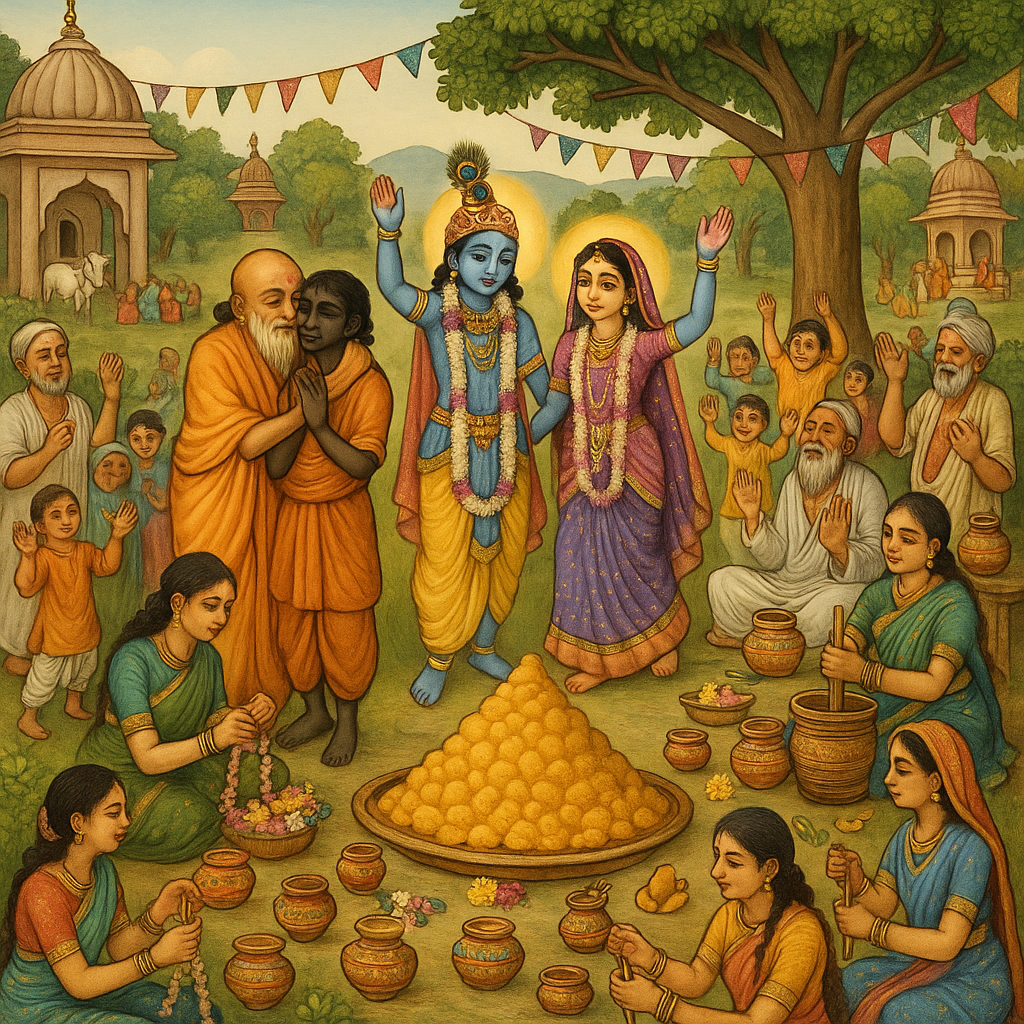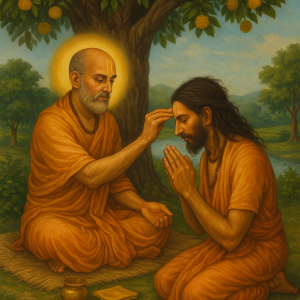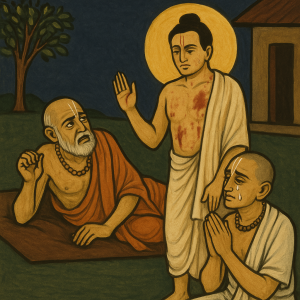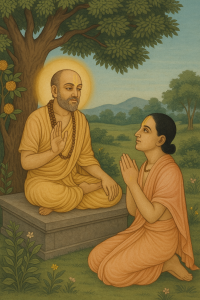(From Śyāmānanda Prakāśa – Chapter 4)
Atonement by Celebration
After Mahāprabhu revealed to Hrdayānanda Gosvāmī the offense he had committed by chastising Śyāmānanda—His very own heart—Hrdayānanda humbly accepted the divine order: to organize twelve great festivals in Vṛndāvana to honor the Lord and His devotee.
No longer motivated by guilt alone, but by the desire to glorify bhakti and its embodiment in Śyāmānanda, Hrdayānanda took up this service with heartfelt sincerity.
But he turned to the very one he had once misunderstood—Śyāmānanda—to carry the torch.
Śyāmānanda Sent to Prepare the Holy Ground
Hrdayānanda said:
“Go to Vṛndāvana, my child. Prepare the land of līlā for celebration. You are the chosen one, and the dust of your feet will sanctify every courtyard we enter.”
With blessings from his guru and the assembly of mahāntas, Śyāmānanda set off, arriving in Vṛndāvana with a heart full of seva and a soul filled with forgiveness.
He went directly to Śrī Jīva Gosvāmī, who embraced him with joyful tears. Śyāmānanda explained everything—the beating, the dream, the festivals—and placed all responsibility in Jīva’s hands.
“O Gosvāmī, I know nothing. I am only your servant. Please organize everything as you see fit.”
The Glorious Cooperation of Vrajavāsīs
Hearing the news of the coming festivals, the Vrajavāsīs rejoiced. They brought ghee, grains, milk, sugar, bananas, jaggery, spices, camphor, incense, flower garlands, and more.
Śrī Jīva, known for his sharp intelligence and deep love for Vṛndāvana, began organizing the details. With affectionate guidance, he engaged devotees from all around Vraja in service:
- Some cleaned the temples and ghāṭas.
- Some arranged the feasts.
- Others carved decorations and planted flags.
- Women wove garlands and churned butter.
- Children danced with kīrtana parties.
- Elders told stories of Kṛṣṇa’s childhood to prepare hearts.
Śyāmānanda moved quietly among them, encouraging, bowing, blessing, and thanking each soul. His humility inspired everyone.
The Overflowing Mountain of Prasāda
The first festival began on the second day of the bright fortnight. With Śrī Jīva at the helm and Śyāmānanda as the servant-leader, the entire Vraja-maṇḍala was illuminated.
So many food items were collected that a literal mountain of bhoga was formed before Śrī Govinda:
- Luchi (fried flatbread), pūri, khīra (sweet condensed milk), lāḍḍū, rasagullā, curd, jaggery sweets, syrupy malpua, and endless rivers of ghee and honey.
It was as if Annakūṭa had manifested again.
The food was not only offered to Kṛṣṇa—it was served with love to thousands of Vaiṣṇavas, villagers, brāhmaṇas, sadhus, and travelers. Everyone, even the beggars and lepers, were given garlands and feasts.
No one left empty-handed. Everyone carried prasāda—and prema—in their hands and hearts.
Days of Rasika Kīrtana and Bhāva
For fifteen continuous days, Vṛndāvana resounded with:
- The chanting of the holy name—thousands of voices echoing “Rādhe! Śyāma!”
- Drama performances depicting Rādhā-Kṛṣṇa’s līlās.
- Kīrtanas that made elders weep and children dance.
- Discussions on the Bhāgavatam, Gīta, and the lives of great saints.
- Devotees rolling on the ground in ecstasy.
- Rivers of tears, not of sorrow, but of longing.
On the full moon, the culmination arrived—Rāsa Utsava, celebrating the divine dance of Rādhā and Kṛṣṇa. It felt as if the very Rāsa-līlā of Goloka had descended onto the Earth.
The air was thick with sandalwood and rose water. The moon appeared fuller, closer, as if drawn in to watch.
Guru and Disciple: A Relationship Restored in Light
After the final festival, Śyāmānanda approached Hrdayānanda, bowed low, and said:
“All this is your mercy. I possess nothing. Whatever was done, was done by your inspiration. Please accept this humble offering.”
He placed five golden coins at his guru’s feet—not as payment, but as symbolic surrender.
Hrdayānanda took him on his lap and whispered:
“You are not my disciple—you are my treasure. Through you, I attained the mercy of Mahāprabhu. You brought honor to my name, even when I gave you pain.”
Their embrace was the final garland offered in this festival of reconciliation.
The Departure of the Mahāntas
The mahāntas, after bathing in the sacred Yamunā and taking darśana of Vṛndāvana’s many līlā-sthalīs, embraced Śrī Jīva and offered their gratitude.
Some said:
“We came to judge, but we leave transformed.”
Others said:
“Vraja is not only land—it is the heart of Śrī Rādhā. And in this heart, Śyāmānanda is eternally embraced.”
They returned to Gauḍa, leaving Vṛndāvana more fragrant than when they arrived.
Reflections and Lessons
- Atonement through glorification purifies the soul and the world: Hrdayānanda could have atoned privately, but public celebration became an act of spiritual healing for all.
- Bhakti binds communities across wounds and misunderstandings: These festivals united hearts that had once been suspicious. Bhakti does not cancel—it reconciles.
- Śyāmānanda’s humility was the real foundation of the festivals: Despite being vindicated and glorified, he remained a servant at heart. That humility opened Vṛndāvana’s treasure chest.
- Festivals in bhakti are not entertainment—they are sādhana: Every aspect of these events—from cooking to singing—became an offering to Rādhā-Kṛṣṇa. This is the real purpose of celebration: to remember the Divine in unity.
- The love between guru and disciple is tested, but never destroyed: When both are sincere, the bond only grows stronger through fire.



